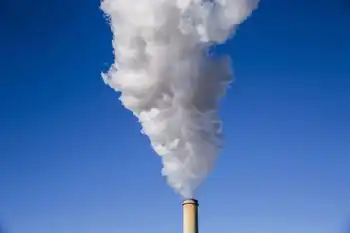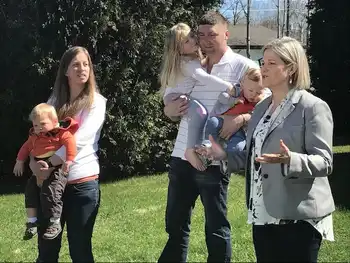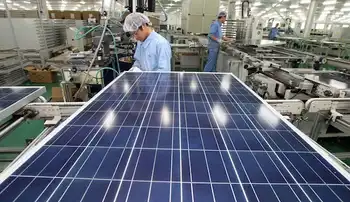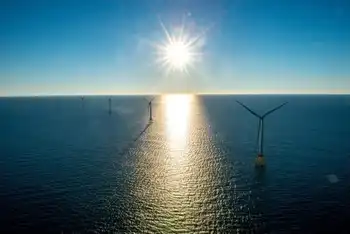EU pressing for nuclear standards
José Manuel Barroso said in a speech at the Organization for Economic Cooperation and Development in Paris that the European Union was “the first big regional actor to make the main international norms for nuclear security internationally binding.”
“Others must now come along with us,” Mr. Barroso said.
If member governments of the Union agree, the bloc is expected to present the proposal at a summit meeting scheduled for Washington in mid-April to be hosted by President Barack Obama, at which world leaders are to discuss balancing the goal of nuclear disarmament with the prospects for rapid growth in the civilian nuclear power sector.
The Union agreed to nuclear safety standards with the International Atomic Energy Agency and adopted them into law last year. The standards include safe construction and operation of reactors, handling of radioactive materials, providing adequate levels of information to the public, using independent safety regulators, and decommissioning.
Many other nations using nuclear power also have similar standards. But Union officials said that making the rules legally binding in Europe had made them more enforceable and they want to see similar standards of enforcement globally. The officials spoke on background because they were not supposed to speak publicly ahead of Mr. BarrosoÂ’s speech.
Mohamed ElBaradei, the director general of the IAEA, praised the EUÂ’s security standards in November, before he stepped down from that job, and he said they should be made binding on all other nations.
The IAEA operates under the Nuclear Nonproliferation Treaty, which is meant to assure that plutonium made in civilian reactors is not transferred to military use.
The initiative shows the Union seeking to ensure that nations using nuclear energy put in place systems, and possibly equipment, with standards as high as EuropeÂ’s, to ensure the peaceable spread of the technology. But the initiative was not designed to promote European technologies or designs in particular, according to the Union officials.
The market for nuclear power is potentially vast. About 400 new reactors could be built worldwide, with many in developing nations, by 2030, according to the industry. Power company executives in Asia estimate that China will build three-quarters of the worldÂ’s new reactors through 2020, making that market critically important for equipment suppliers.
Partly because of political tensions over the years with the United States, China has relied very heavily on European equipment, starting with the reactors at Daya Bay in Shenzhen in the mid-1990s.
Although the IAEA says that China does meet Western standards in building and operating nuclear reactors, it has raised concern about whether enough skilled inspectors can be trained to monitor the new reactors being built.
Other Western nuclear power experts are worried about the possible effects of corruption and excessive cost cutting of the sort already seen in scandals involving the safety of Chinese exports ranging from toys to pharmaceuticals.
France is the worldÂ’s second-biggest nuclear power producer after the United States but gets a far larger proportion of its electricity from atoms.
But attempts by Areva, the nuclear contractor controlled by the French state, to sell plants and equipment overseas have fallen flat in recent months.
French companies including Areva, Électricité de France and the oil giant Total lost out in December to a South Korean-led consortium, which offered a far lower price to build four reactors in the United Arab Emirates.
Anne Lauvergeon, the chief executive of Areva, told the French daily Le Monde in January that the South Koreans had been “ready to do anything to win” the deal in terms of price and state support.
Areva also is battling construction delays and massive cost overruns at Olkiluoto in Finland and Flamanville in France, where it is building the first versions of its so-called EPR reactor.
Another concern for nuclear manufacturers is the acceptance of the technology in Europe.
Mr. Barroso also planned to stress the need for European Union legislation on the disposal of high-level radioactive waste to encourage acceptance of nuclear power within the 27-nation bloc.
Nuclear fission produces no greenhouse gases, but the vast majority of Europeans remain wary about the technology in the absence of a plan to treat the waste safely.
Nuclear power still is hugely sensitive in Europe nearly a quarter-century after the disaster in Chernobyl in Ukraine, when a Soviet-era reactor melted down and radioactive particles were blown over parts of Western Europe.
Seeking to address some of those concerns, Mr. Barroso also will announce plans for new legislation promoting the permanent burial of the waste deep underground in geologically stable areas.
Around the world, waste and spent fuel are stored on an interim basis in pools of water or in casks, many near ground level. That leads to concerns about the vulnerability of the materials to disasters like terrorist attacks, and it raises persistent questions about whether the materials can be effectively monitored for periods that exceed recorded human history many times over.
The legislation suggested by Mr. Barroso would oblige member states to adhere to standards on waste disposal, and it would oblige member states to put in place national programs to handle waste. But the legislation would not mandate a date to establish underground disposal sites.
There are no long-term facilities for disposing or burying high-level nuclear waste anywhere in the world, although a Finnish company, Posiva, is digging a tunnel at Olkiluoto in anticipation of final approval for storing waste a quarter of a mile underground.
A Swedish consortium of reactor operators says it has found a suitable site, won agreement from the local government to bury waste permanently there, and is seeking government licensing. U.S. authorities had sought to store high-level waste inside Yucca Mountain, in Nevada, but that plan foundered because of local opposition.
Greenpeace, an environmental group opposed to nuclear power, contends that waste from the latest reactors by Areva will be more radioactive by a factor of seven because more uranium is burned up, making it more expensive to handle and store safely. Areva has called the claim by “grossly inaccurate” and said the waste would be 15 percent more radioactive at the most.
Related News
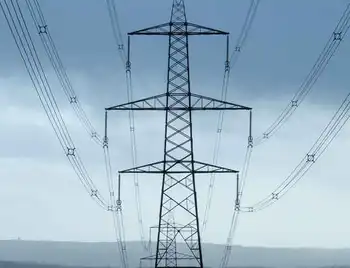
More red ink at Manitoba Hydro as need for new power generation looms
WINNIPEG - Manitoba's NDP administration has declared its intention to formulate a strategy for financing new energy ventures, following a decision to halt the development of additional private-sector wind farms. This plan will accompany efforts to stabilize hydroelectric rates and manage the financial obligations of the province's state-operated energy company.
Finance Minister Adrien Sala, overseeing Manitoba Hydro, shared these insights during a legislative committee meeting on Thursday, emphasizing the government's desire for future energy expansions to remain under public ownership and expressing trust in Manitoba Hydro's governance to realize these goals.
This announcement was concurrent with Manitoba Hydro unveiling increased financial losses…


